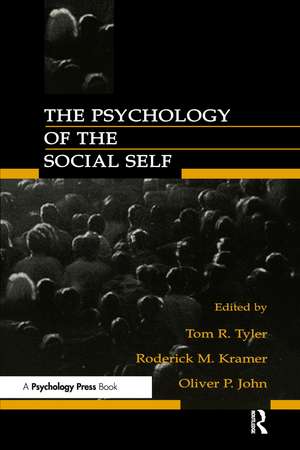The Psychology of the Social Self: Applied Social Research Series
Editat de Tom R. Tyler, Roderick M. Kramer, Oliver P. Johnen Limba Engleză Paperback – dec 1998
Preț: 482.45 lei
Nou
Puncte Express: 724
Preț estimativ în valută:
92.31€ • 96.66$ • 76.57£
92.31€ • 96.66$ • 76.57£
Carte tipărită la comandă
Livrare economică 09-23 aprilie
Preluare comenzi: 021 569.72.76
Specificații
ISBN-13: 9780805828504
ISBN-10: 0805828508
Pagini: 288
Ilustrații: illustrations
Dimensiuni: 152 x 229 x 18 mm
Greutate: 0.45 kg
Ediția:UK edition
Editura: Taylor & Francis
Colecția Psychology Press
Seria Applied Social Research Series
Locul publicării:Oxford, United Kingdom
ISBN-10: 0805828508
Pagini: 288
Ilustrații: illustrations
Dimensiuni: 152 x 229 x 18 mm
Greutate: 0.45 kg
Ediția:UK edition
Editura: Taylor & Francis
Colecția Psychology Press
Seria Applied Social Research Series
Locul publicării:Oxford, United Kingdom
Public țintă
ProfessionalCuprins
Contents: T.R. Tyler, R.M. Kramer, O.P. John, Introduction: What Does Studying the Psychology of the Social Self Have to Offer to Psychologists? Part I:Theoretical Perspectives. J.C. Turner, R.S. Onorato, Social Identity, Personality, and the Self-Concept: A Self-Categorization Perspective. B. Simon, A Place in the World: Self and Social Categorization. M.B. Brewer, C.L. Pickett, Distinctiveness Motives as a Source of the Social Self. Part II:The Nature of the Social Self. K. Deaux, A. Reid, K. Mizrahi, D. Cotting, Connecting the Person to the Social: The Functions of Social Identification. B.W. Pelham, J.J. Hetts, Implicit and Explicit Personal and Social Identity: Toward a More Complete Understanding of the Social Self. R.M. Kramer, J. Wei, Social Uncertainty and the Problem of Trust in Social Groups: The Social Self in Doubt. Part III:Social Context and the Social Self. J. Crocker, H. Blanton, Social Inequality and Self-Esteem: The Moderating Effects of Social Comparison, Legitimacy, and Contingencies of Self-Esteem. S.K. Su, C-Y. Chiu, Y-Y. Hong, K. Leung, K. Peng, M.W. Morris, Self-Organization and Social Organization: U.S. and Chinese Constructions. T.R. Tyler, H.J. Smith, Justice, Social Identity, and Group Processes.
Recenzii
"Social psychologists have long grappled with questions surrounding people's motivation to interact with others. More specifically, inquiry has often focused on two questions: (1) What motivates people to engage in group interaction? and (2) How are such motives mediated through social context? The contributors to this edited volume address these questions in innovative and thought provoking ways by elaborating on social identity and self-categorization theories.
"Taken as a whole, The Psychology of the Social Self will undoubtedly be a useful resource to mainstream social psychologists whose research interests revolve around the relationships between personal identity, social identity, and group membership. This text will also benefit graduate courses in social psychology, self and society, experimental methods, social networks, and perhaps inequality."
—Contemporary Sociology
"...a provocative alternative model of the self that is sure to stimulate new developments for years to come....provides a valuable counterpoint to the prevailing emphasis on the personal, private, individual, unique self that has dominated much research on social personality psychology...these chapters elaborate and extend the theme of social identity theory in many theoretically rich ways....This volume continues to nudge researchers toward a more full-orbed, thoroughtly social theory of the self."
—Contemporary Psychology
"Taken as a whole, The Psychology of the Social Self will undoubtedly be a useful resource to mainstream social psychologists whose research interests revolve around the relationships between personal identity, social identity, and group membership. This text will also benefit graduate courses in social psychology, self and society, experimental methods, social networks, and perhaps inequality."
—Contemporary Sociology
"...a provocative alternative model of the self that is sure to stimulate new developments for years to come....provides a valuable counterpoint to the prevailing emphasis on the personal, private, individual, unique self that has dominated much research on social personality psychology...these chapters elaborate and extend the theme of social identity theory in many theoretically rich ways....This volume continues to nudge researchers toward a more full-orbed, thoroughtly social theory of the self."
—Contemporary Psychology
Notă biografică
Tom R. Tyler, Roderick M. Kramer, Oliver P. John
Descriere
This volume builds upon the social identity theory based assumption that people create a social self. This core assumption provides the framework for a creative study of a wide variety of aspects of the self and social interaction.





